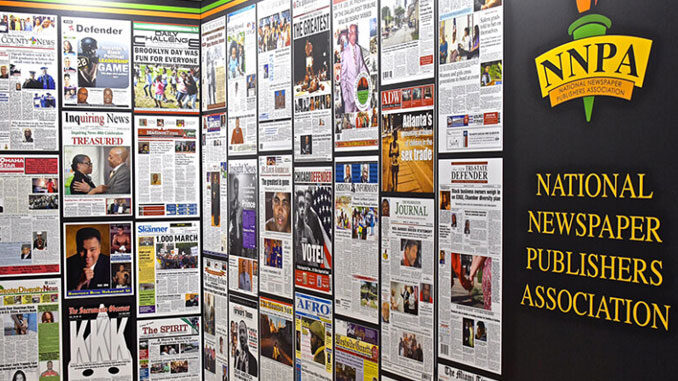
Stacy M. Brown NNPA Newswire Senior National Correspondent
On the surface, the Journalism Competition and Preservation Act sounds like a win for news organizations that remain committed to providing vital information for their communities.
It also sounds suitable for the survival of important local news.
However, like many pieces of legislation that float around Capitol Hill, flaws abound.
Intended to support local journalism, the bill introduced by Sen. Amy Klobuchar (D-MN) would create a link tax on social media platforms.
The bill suggests lawmakers would carve out an exception in the federal antitrust law and allow U.S. publishers to negotiate payment from websites that profit from aggregating lists of links on the search and social media platforms where users can click on and visit a news site.
In Klobuchar and her colleagues’ attempt to save local news from tech behemoths like Google, Facebook, and Twitter, critics contend that the legislation would be the final nail in the coffin of small and minority-owned newspapers and media companies.
The National Newspaper Publishers Association (NNPA), the trade organization representing more than 230 African American-owned newspapers and media companies, count among those objecting to the measure.
For further clarity, the NNPA represents the interest of the Black Press of America, which for 195 years, has published through slavery, Jim Crow, Civil Rights, and the modern-day era of Fake News.
“The JCPA would require tech platforms to carry and pay any eligible news publisher for ‘access’ to content. While this may, again, seem well-intentioned at first look, upon deeper inspection, the law defines ‘access’ so broadly it will require payment for simply crawling a website or sharing a link,” NNPA President and CEO Dr. Benjamin F. Chavis Jr. wrote in an editorial.
“Similarly, while a number of conglomerates are scoped into the bill, true independent or small newspapers are explicitly excluded from the legislation because the bill says that an eligible publisher must earn more than $100,000 per year,” Chavis asserted.
The primary problem? “The bill itself wouldn’t address the underlying problems that have news organizations struggling economically,” Jeremy Littau of Future Tense wrote.
Littau further noted the bill’s structural problem.
“The internet is built in ways that favor free link exchange, and news organizations risk not being missed if they are booted from platforms whose business ironically is built to deliver them traffic,” he wrote.
“There’s no oversight or accountability for whatever money is paid out to know whether the JCPA actually works as intended.”
Littau continued:
“Finally, there’s the innovation problem related to who is excluded. The JCPA would subsidize dying brands and, likely to avoid weighing in on the tiresome debate over whether bloggers are journalists, creates the $100,000 threshold that leaves behind some of our most promising news startups. The future of news can’t be about propping up struggling legacy players and punishing innovators.”
Chavis also related that many African American and other BIPOC news outlets are independently owned.
Furthermore, these news outlets have developed and grown their audiences because mainstream media publications excluded the perspectives of minority voices.
“The Black Press built our own news outlets to support our own voices. As a result, this legislation would only further reinforce harmful racial exclusion trends rather than actually help smaller local publications like those in the NNPA,” Chavis insisted.
“Similarly, recent amendments to the bill requiring non-discrimination would require platforms to carry and pay for hate speech and objectionable content that could harm BIPOC communities.”
He said if passed, the JCPA would boost misinformation and extremist content. News publications from either side of the aisle that support extremist views will receive money, and tech platforms will be required to carry them on their services.
“This will make it even harder for platforms to moderate harmful and false content. We know that communities like ours will suffer most,” Chavis concluded.
Sen. Klobuchar did not respond to a request for comment from the Black Press.
Several lawmakers in both chambers, including Senate Majority Leader Chuck Schumer (D-N.Y.), Sen. Cory Booker (D-N.J.), Rep. Al Green (D-Texas), Rep. Hakeem Jeffries (D-N.Y.), Rep. Stacey Plaskett (D-V.I.), and Rep. Sheila Jackson Lee (D-Texas), also did not return messages.
“Instead of supporting local broadcasters and improving our access to the news, the JCPA favors big broadcasters and threatens our ability to find factual information online,” ACLU officials said.
Officials at the nonprofit Public Knowledge argued that the legislation would do nothing to help preserve local journalism.
They further claimed that it could compound some of the biggest problems in the information landscape today, including consolidation and declining quality of information.
“While the JCPA has undergone extensive rewrites, it is still an antitrust exemption, a legal maneuver that has a history of failing to achieve beneficial goals,” said Lisa Macpherson, Senior Policy Analyst at Public Knowledge.
“Allowing the largest media conglomerates – like Alden Global Capital, Gannett, Sinclair Broadcast Group, and News Corp – to collude on the terms of access and value of their content will hurt competition and make our news landscape worse, not better.”
Macpherson continued:
“In a bill that is supposedly meant to encourage local journalism, there is no accountability for how the money is spent. Facebook and Google will fund more stock buybacks and executive bonuses than journalists’ salaries. It also introduces a precedent of payment for simply linking to information on the internet.
“This bill is also a threat to content moderation. The JCPA allows publishers to sue Facebook or Google for taking down content that the platforms find offensive or contrary to their community standards.
“And with the most recent amendment, proposed by Sen. Cruz (R-Texas), harmful misinformation, networked disinformation, and hate speech will be even harder to police under this bill — and that is by design.
“The JCPA will not save local journalism. Instead, it will make a few billionaires even wealthier at the expense of a healthy and open internet and information environment for all of us.”
Recommended For You.



Be the first to comment